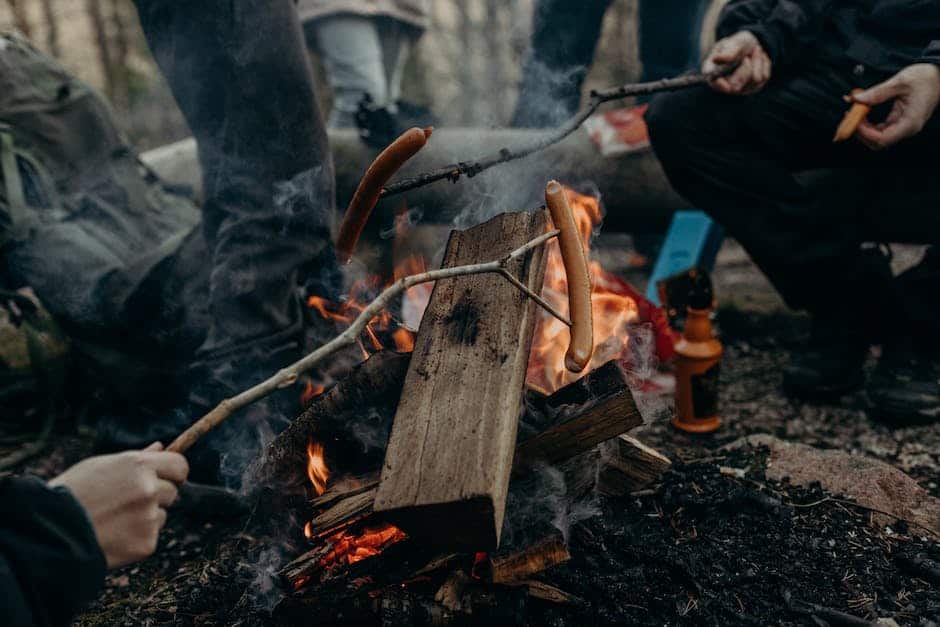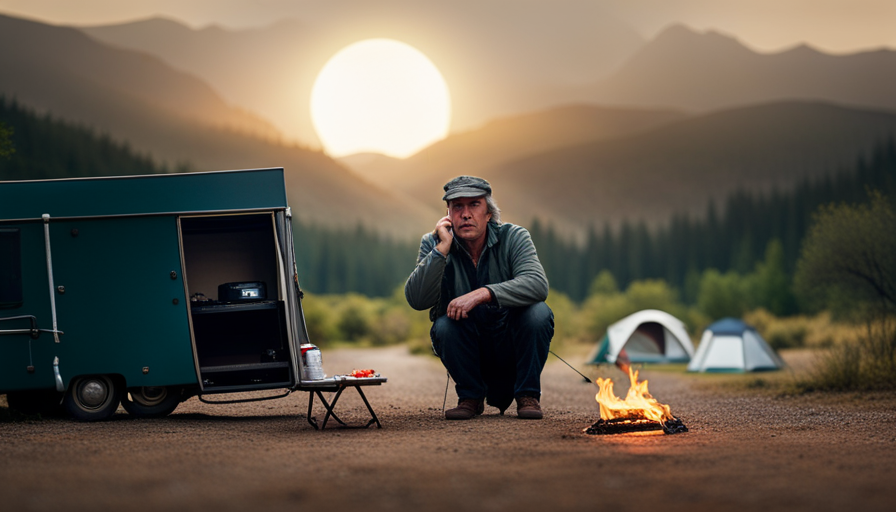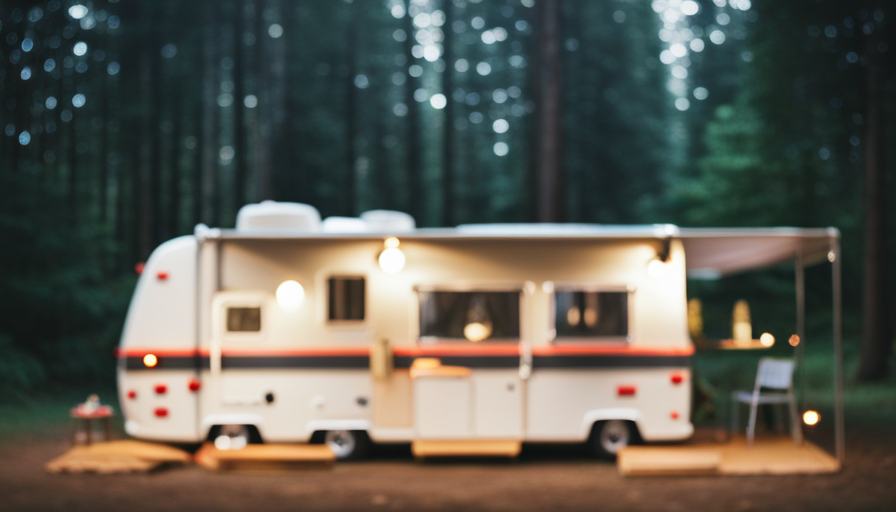Have you ever encountered the scary situation of finding rodents scurrying around in your camper? I certainly have, and let me tell you, it’s not pleasant. These tiny pests can disrupt your camping experience by destroying your belongings and spreading illnesses.
But fear not, because I’m here to share with you some expert tips on how to keep rodents out of your camper.
Imagine this: you’re enjoying a peaceful evening in the wilderness, when suddenly you hear the pitter-patter of tiny feet. You look up and see a family of mice making themselves at home in your camper. It’s a nightmare scenario, but with the right knowledge and preventive measures, you can ensure that this never happens to you.
In this article, I will guide you through a step-by-step process to safeguard your camper from these unwanted guests. From sealing all entry points to using natural deterrents and setting traps, I’ll provide you with effective solutions that will keep your camper rodent-free.
So, let’s get started and make sure your camping adventures remain a joyful experience, free from the intrusion of pesky rodents.
Key Takeaways
- Sealing entry points with steel wool, caulk, and wire mesh is important.
- Cleaning and decluttering the camper can prevent rodents from making themselves at home.
- Removing food sources is crucial in preventing rodent infestations.
- Utilizing natural deterrents like peppermint oil, vinegar, and essential oils can help keep rodents away.
Seal All Entry Points
You should seal all entry points to keep those pesky rodents out of your camper. Rodents can be quite crafty when it comes to finding their way into your camper, but with the right rodent proofing techniques, you can prevent them from entering.
Start by inspecting your camper thoroughly and identifying the common entry points for rodents. These can include gaps around pipes, vents, and windows, as well as holes in the floor or walls. Use a combination of materials like steel wool, caulk, and wire mesh to seal these openings. Remember, rodents can squeeze through even the tiniest holes, so be meticulous in your sealing efforts.
By sealing all entry points, you create a barrier that rodents cannot easily penetrate. This will significantly reduce the chances of them infesting your camper and causing damage to your belongings.
Once you have completed this step, you can move on to the next section about cleaning and decluttering your camper. Maintaining a clean and clutter-free environment will further discourage rodents from taking up residence in your camper.
In order to keep rodents out of your camper, it’s important to take a proactive approach. By sealing all entry points, you can fortify your camper against these unwanted guests. Now, let’s move on to the next step of cleaning and decluttering your camper.
Clean and Declutter Your Camper
Decluttering and cleaning your camper not only creates a more organized space, but also helps prevent rodents from making themselves at home. When it comes to pest prevention, keeping a clean and tidy camper is essential.
Rodents are attracted to cluttered areas where they can hide and build nests, so it’s important to remove any unnecessary items and keep your camper free of debris. Start by decluttering your camper and getting rid of anything you don’t need. This will not only create more space, but also eliminate potential hiding spots for rodents. Store items in sealed containers to prevent rodents from accessing them.
Additionally, make sure to regularly clean and vacuum your camper to remove any crumbs or food particles that may attract pests. Organizational tips can also help in preventing rodent infestations. Use storage solutions such as plastic bins or zippered bags to keep your belongings organized and protected. Avoid leaving clothes or linens on the floor, as rodents can use them for nesting material.
By decluttering and cleaning your camper, you are taking important steps to keep rodents out. However, there is another crucial aspect to consider: removing food sources. This will be discussed in the next section.
Remove Food Sources
To effectively prevent rodent infestations, it’s crucial to eliminate any food sources within your camper. By taking preventive measures and implementing a few simple strategies, you can create an environment that isn’t attractive to rodents. Here are three tips to help you remove food sources and keep those pesky critters away:
-
Store all food in rodent-proof containers: Invest in sturdy containers that rodents can’t chew through. Plastic bins with tight-fitting lids are a great option. Make sure to store all food, including dry goods and snacks, in these containers to prevent rodents from accessing them.
-
Clean up spills and crumbs immediately: Rodents are attracted to any food residue left behind. Regularly sweep and vacuum your camper to remove any crumbs or spills. Pay special attention to the kitchen area and dining table where food is often consumed.
-
Empty and clean your refrigerator before leaving: If you plan to store your camper for an extended period, make sure to empty and thoroughly clean your refrigerator. Any lingering food odors can attract rodents, so it’s essential to remove all food and wipe down the interior.
By following these preventive measures and using rodent-proof containers, you can significantly reduce the risk of attracting rodents into your camper. In the next section, we’ll discuss how to use rodent repellents to further protect your camper from these unwanted guests.
Use Rodent Repellents
Implementing rodent repellents can create a safer and more secure environment within your camper, ensuring that these unwanted pests stay far away. One effective method is using ultrasonic devices, which emit high-frequency sound waves that are inaudible to humans but very irritating to rodents. These devices can be easily installed in your camper and work by creating a hostile environment that rodents want to avoid.
Another natural repellent to consider is peppermint oil. Rodents are repelled by the strong scent of peppermint, so placing cotton balls soaked in peppermint oil in areas where rodents may enter can discourage them from coming inside. Additionally, peppermint oil is a safe and non-toxic alternative to chemical repellents.
By incorporating ultrasonic devices and peppermint oil as rodent repellents, you can effectively deter rodents from entering your camper and causing damage. However, it’s important to remember that these repellents may not completely eliminate the rodent problem.
In the next section, we’ll explore additional steps you can take to set traps and baits, which will further safeguard your camper from these pesky intruders.
Set Traps and Baits
With a well-placed trap or strategically baited area, you can lure unwanted guests away from your camper and into their own demise, creating a fortress of protection against these pesky intruders. Here are some effective measures to help you keep rodents out of your camper:
-
Rodent-proof insulation: Insulating your camper with materials that rodents can’t chew through is crucial. Use steel wool, aluminum mesh, or expanding foam to seal any gaps or openings that could serve as entry points.
-
Outdoor rodent control measures: Create a barrier around your camper by placing rodent repellent plants, such as mint or lavender, around the perimeter. Remove any debris, such as fallen branches or tall grass, that could provide hiding places for rodents near your camper. Additionally, consider using ultrasonic devices or motion-activated sprinklers to deter rodents from approaching your camper.
By implementing these rodent control measures, you can greatly reduce the risk of rodents infiltrating your camper. However, keeping your camper clean and tidy is also essential in preventing rodents from being attracted to your space.
Keep Your Camper Clean and Tidy
Now that you’ve set traps and baits to catch those pesky rodents, it’s important to take preventative measures to ensure they don’t return. One effective way to do this is by keeping your camper clean and tidy.
Maintaining a rodent-free environment starts with good organization and cleanliness. Start by decluttering and organizing your storage spaces. Rodents are attracted to cluttered areas where they can hide and find food. Make sure to seal any cracks or openings in your camper where rodents can enter. Use steel wool or caulk to fill in these gaps.
Regularly clean your camper, paying close attention to areas where food crumbs or spills may accumulate. Vacuum carpets and upholstery, as these can harbor food particles that attract rodents. Store all food in airtight containers to eliminate any potential food sources for rodents.
By keeping your camper clean and organized, you’re creating an environment that’s less attractive to rodents. This will greatly reduce the chances of them returning.
In the next section, we’ll discuss how to use natural deterrents to further protect your camper from these unwanted guests.
Use Natural Deterrents
One great way to ensure your camper remains rodent-free is by utilizing natural deterrents. Not only are these methods effective, but they’re also eco-friendly ways to keep rodents out.
There are several natural deterrents for mice that you can easily implement in your camper. Peppermint oil is one such deterrent that mice dislike. Simply soak cotton balls in peppermint oil and place them in areas where mice might enter, such as near doors or windows.
Another effective natural deterrent is vinegar. Mice have a strong aversion to the smell of vinegar, so spraying a mixture of vinegar and water around your camper can help keep them away.
Additionally, you can use essential oils like citronella, lavender, or eucalyptus, as mice find these scents unpleasant.
By incorporating these natural deterrents, you can create an environment that’s uninviting to rodents and prevent them from entering your camper.
In the next section, we’ll discuss how to store food properly to further deter rodents from invading your space.
Store Food Properly
Make sure you lock away your food stash tightly, sealing it like a fortress, so those pesky critters don’t get a whiff of your delicious snacks. Proper food storage is essential in preventing rodent infestation in your camper. These crafty creatures can squeeze through tiny openings and wreak havoc on your food supplies. To keep them at bay, follow these simple guidelines:
| 1. Cleanliness | 2. Airtight Containers | 3. Elevated Storage | 4. Regular Inspections |
| Keep your camper clean and free of food debris. | Store your food in airtight containers to eliminate any tempting scents. | Elevate your food storage to make it harder for rodents to access. | Regularly inspect your camper for any signs of rodent activity. |
Keeping your camper clean is the first line of defense. Any food crumbs or spills can attract rodents, so regularly sweep and mop to remove any traces of food. Additionally, storing your food in airtight containers is crucial. This will not only keep your snacks fresh, but also prevent rodents from detecting the delicious aroma. Elevating your food storage can also make it more difficult for rodents to reach. Consider using shelves or hanging storage to keep your food out of their reach.
Proper food storage is key in preventing rodent infestation in your camper. By maintaining cleanliness, using airtight containers, and elevating your food storage, you can create a rodent-proof environment. Remember to regularly inspect your camper for any signs of rodent activity to ensure a pest-free camping experience. Transitioning into the next section, let’s explore how regularly inspecting your camper can help in keeping rodents at bay.
Regularly Inspect Your Camper
Regularly inspecting your camper ensures a pest-free environment and helps in preventing any unwelcome visitors from entering. To keep rodents out of your camper, it’s important to inspect it thoroughly on a regular basis.
Start by checking for any damages that could potentially serve as entry points for rodents. Look for holes or cracks in the walls, floors, and ceilings, as well as gaps around windows and doors. Rodents can squeeze through even the tiniest openings, so it’s crucial to seal any potential entry points.
During your inspection, pay close attention to areas where rodents are likely to hide or nest, such as storage compartments, cabinets, and underneath furniture. Look for any signs of rodent activity, such as droppings, chew marks, or nests. If you do find any signs of rodents, take immediate action to eliminate them and prevent further infestation.
Regularly inspecting your camper is an essential step in keeping rodents out. By identifying and fixing any damages or potential entry points, you can create a barrier that rodents cannot penetrate. However, if your efforts to keep rodents out are unsuccessful, don’t hesitate to seek professional help. Pest control experts have the knowledge and experience to effectively eliminate rodent problems and provide solutions to prevent future infestations.
Seek Professional Help if Needed
If you’re having trouble with pesky rodents in your camper, don’t hesitate to reach out to professional pest control experts for help. They have the knowledge and tools to effectively eliminate rodent infestations and prevent them from returning. However, there are also some DIY methods you can try to keep rodents out of your camper.
One common sign of a rodent infestation in a camper is finding droppings or urine stains. If you notice these, it’s important to take action immediately to prevent further damage. Another sign is gnaw marks on furniture, wiring, or insulation. Rodents have sharp teeth that they use to chew through materials, so be on the lookout for any signs of damage.
To prevent rodents from entering your camper, there are a few simple steps you can take. First, seal any cracks or openings where they could squeeze through. Use steel wool or caulk to fill in gaps around windows, doors, and utility lines. Additionally, keep your camper clean and free of food debris. Rodents are attracted to food sources, so make sure to store all food in airtight containers and clean up any spills or crumbs.
Incorporating these DIY methods along with seeking professional help if needed, will help keep rodents out of your camper and ensure a pest-free camping experience.
Frequently Asked Questions
Can I use essential oils as a natural deterrent for rodents in my camper?
Yes, you can use essential oils as a natural deterrent for rodents in your camper. Certain oils like peppermint, eucalyptus, and lavender have strong scents that rodents don’t like. Simply place a few drops of these oils on cotton balls and strategically place them around your camper to create a barrier.
Additionally, you can use other alternative natural deterrents such as ultrasonic devices, sealing any entry points, and keeping food tightly sealed.
How often should I inspect my camper for signs of rodent activity?
I recommend inspecting your camper for signs of rodent activity at least once a month. This regular inspection will help you catch any infestations early on and prevent further damage.
As for ultrasonic devices, they can be effective in repelling rodents, but their effectiveness may vary. It’s best to use them in conjunction with other rodent deterrent methods for maximum effectiveness in keeping your camper rodent-free.
Are there any specific types of traps or baits that work best for keeping rodents out of campers?
When it comes to keeping rodents out of campers, there are a few effective options. Ultrasonic devices are a popular choice as they emit high-frequency sounds that rodents find irritating. These devices can be easily installed in your camper to deter pests.
Additionally, there are natural rodent repellents available, such as peppermint oil or mothballs, which can be placed strategically to keep rodents at bay. Both of these options provide effective solutions for keeping your camper rodent-free.
What are some common signs that rodents have entered my camper?
Common signs of rodent activity in your camper include finding droppings, chewed food packages, or nesting materials. You may also hear scurrying or scratching noises. These indicators suggest that rodents have entered your camper and are making themselves at home. It’s important to address this issue promptly to prevent further damage and potential health risks. By understanding these common signs, you can take appropriate measures to eliminate the rodents and keep your camper rodent-free.
Is it necessary to store all food in airtight containers to prevent rodents from accessing it?
Storing food properly is essential in preventing rodents from accessing it. Using airtight containers is a highly effective deterrent as it eliminates any enticing smells that may attract rodents.
Additionally, it’s important to clean up any food spills or crumbs immediately, as these can also attract rodents. Taking these precautions will greatly reduce the likelihood of rodents entering your camper and keep your food safe from their unwanted presence.
Conclusion
In conclusion, keeping rodents out of your camper is essential for a peaceful and rodent-free camping experience. By following the steps outlined in this article, you can create a fortress against these unwanted guests.
Remember, just like the pied piper led the rats away, you too can lead rodents away from your camper by sealing entry points, removing food sources, using repellents, and setting traps.
With a little effort and the right techniques, you can enjoy your camping adventures without any unwanted furry visitors.










